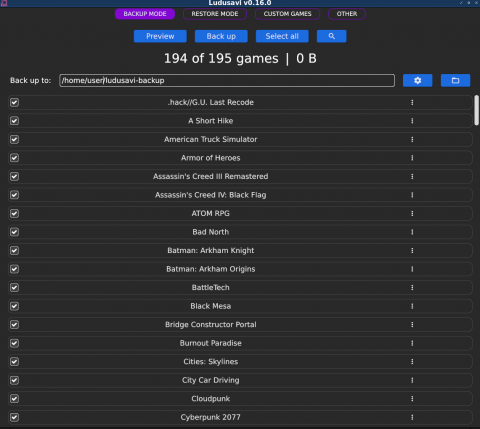Ludusavi: v0.22.0 veröffentlicht

Ludusavi, das Tool um Backups von Speicherständen von Spielen anzufertigen, ist in der Version v0.22.0 veröffentlicht worden.
v0.22.0 (2023-12-26) Latest
Added:
You can now configure additional manifests, which Ludusavi will download and use just like the primary one. This allows the community to create additional save lists for specific purposes that might not be covered by PCGamingWiki.
You can now configure a custom game as an alias for another game, without having to make a copy of the other game's info. On the custom games screen, use the dropdown to toggle between "game" (default) and "alias".
You can now configure roots for OS installations on other drives. New root types: Windows drive, Linux drive, Mac drive
Ludusavi can now scan Legendary games on their own without Heroic. New root type: Legendary
CLI: wrap command to do a restore before playing a game and a backup afterwards. (Contributed by sluedecke)
When a path or URL fails to open, additional information is now logged.
On Windows, Ludusavi can now back up additional types of registry data: REG_NONE, REG_DWORD_BIG_ENDIAN, REG_LINK, REG_RESOURCE_LIST, REG_FULL_RESOURCE_DESCRIPTOR, REG_RESOURCE_REQUIREMENTS_LIST.
On Windows, Ludusavi now recognizes if you've moved the %USERPROFILE%\Saved Games folder.Changed:
GUI: A different icon is now used for the button to hide the backup comment field. The previous icon (a red X) could have been misinterpreted as "delete" rather than "close".
GUI: When you click the filter icon on the backup/restore screen, the title search field is automatically focused.
CLI: Help text is now styled a bit differently.
Updated translations, including a new in-progress Czech translation. (Thanks to contributors on the Crowdin project)Fixed:
GUI: On some systems using Wayland, Ludusavi would crash on startup.
When storing file modified times in zip archives, if the year is too old for zip to support (i.e., before 1980), Ludusavi will now round up to the earliest supported date (1980-01-01).
When backing up a malformed dword-type value from the registry, Ludusavi would silently convert it to a default 0, which could result in data loss when restored. Now, invalid registry values are backed up and restored as-is.
If Ludusavi encountered an error when restoring a specific file, it would retry up to 99 times in case it was just a temporary error. This was primarily intended to handle cases of duplicate backups that might cause a file to be busy, but it would also cause excessive delays for other, persistent errors. Now, Ludusavi will only try once per file.
GUI: When a custom game was disabled, its refresh button would do nothing. The refresh button will now be disabled for that game.
